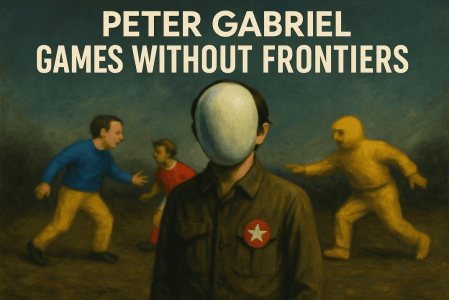Peter Gabriel released Games Without Frontiers in 1980 as part of his third solo album, often referred to as Melt. At a time when Cold War tensions were high, the song stood out for its sharp, surreal take on international politics. Rather than shouting its message, it whispered warnings through strange, childlike images.
The track doesn’t just reflect its era—it cuts through it. Beneath its catchy rhythm and eerie tone lies a commentary on how nations treat war like a sport, complete with teams, uniforms, and spectators. Games Without Frontiers remains relevant because it shows how easily conflict can be dressed up as play, and how quickly we forget the cost.
Historical & Political Backdrop
In 1980, the world sat on edge. The Cold War was in full force, with the United States and the Soviet Union locked in an arms race. Nuclear threats loomed large. Propaganda shaped public opinion on both sides, and diplomacy often took a back seat to military posturing.
Against this tense backdrop, Games Without Frontiers draws a sharp parallel between global politics and a European game show called Jeux Sans Frontières (“Games Without Borders”). The show featured countries competing in bizarre, often childish challenges while dressed in silly costumes. Gabriel uses this as a metaphor: world powers, like the game show contestants, act out dangerous rivalries under the guise of unity and entertainment. It’s satire, but it cuts close to the truth—turning war into a game played by leaders with little regard for the consequences.
Lyrical Dissection
Peter Gabriel’s lyrics in Games Without Frontiers carry heavy meaning beneath their seemingly simple phrases. He paints a world where childish games and deadly politics blur into one.
The line “If looks could kill, they probably will” sets the tone. It shows how easily hostility can flare from small gestures—how the same petty rivalries seen on a playground can scale into global standoffs. The song’s characters—Hans, Lottie, Enrico—play war-like games, echoing the behavior of real-world nations posturing for dominance.
The chorus, “Games without frontiers, war without tears,” is the song’s thesis. It points to the sanitized way countries often frame conflict—strategic, clinical, and devoid of the pain and chaos it truly brings. Gabriel’s use of repetition and irony strips the glamor from war, leaving only the absurdity.
Artistic & Production Choices
The unsettling power of Games Without Frontiers lies not just in its lyrics but in how it sounds. From the start, the track builds an eerie atmosphere—cold, mechanical drums, minimalist synth lines, and distant guitar textures create a sense of unease. It feels detached, almost clinical, reflecting the sterile way governments often approach real conflict.
Kate Bush’s haunting backing vocals float through the chorus like a ghostly echo. Her soft, childlike tone deepens the contrast between innocence and aggression. It’s a clever move—pairing a voice that suggests playfulness with lyrics about war.
This use of juxtaposition runs through the entire song. Gabriel blends imagery of playground games with undertones of espionage and military strategy. The production mirrors this, keeping the music tight and repetitive, like a looped simulation. It all works to expose the surreal logic of treating warfare as a competitive spectacle.
Interpretation & Legacy
Games Without Frontiers is a clear critique of nationalism and the way political leaders turn real human conflict into performative gestures. Gabriel exposes how easily governments fall into patterns of showmanship—drawing borders, staging standoffs, and pushing propaganda, all while avoiding the human cost. By presenting war as a game, the song highlights how desensitized the public can become when violence is framed as strategy.
Decades later, the message still resonates. In today’s political climate—marked by media spin, power plays, and rising tensions between global powers—the song feels eerily familiar. Its themes of spectacle and detachment echo through modern conflicts where technology often shields people from the physical reality of war.
Games Without Frontiers also helped shape Peter Gabriel’s reputation as more than a musician. It marked a shift toward socially conscious songwriting that would define much of his later work. The song’s bold stance contributed to the evolution of protest music, proving that political commentary could live within pop structures without losing its bite.
Closing Thoughts
Games Without Frontiers strips war of its heroism and exposes it as a distorted game of pride and politics. Through sharp lyrics, unsettling production, and haunting vocals, Peter Gabriel delivers a pointed critique of how nations play at conflict while hiding the consequences from view.
More than four decades later, the song still holds weight. Its message about the dangers of nationalism, posturing, and emotional distance in warfare remains deeply relevant. Gabriel didn’t just capture a moment in time—he created a warning that continues to echo in ours.
